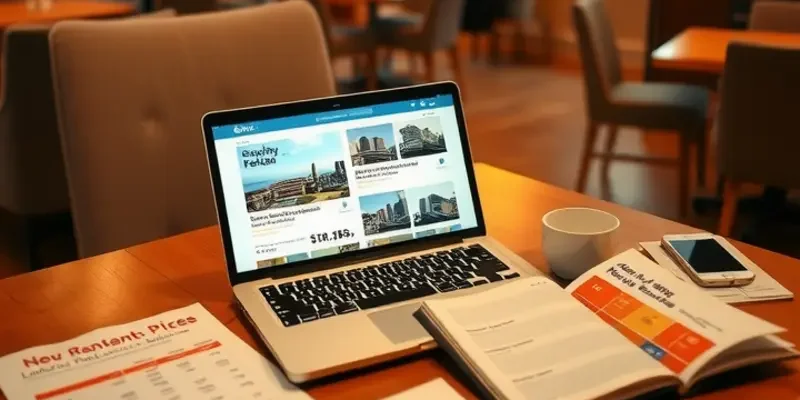Finding the perfect apartment can be both thrilling and daunting, especially for young professionals, first-time renters, students, couples, and families. Rent negotiation is an essential skill that can ensure that your future home fits your budget and needs. Unfortunately, many renters settle for the first offer presented, overlooking the potential for negotiation. Knowing how to navigate this process can unlock better deals and elevate your confidence in your leasing journey. This guide will equip you with practical strategies tailored to your specific situation. By leveraging these techniques, you’ll be more prepared to engage landlords and secure favorable terms on your lease, giving you the financial clarity and lease guidance you desire. Whether you’re eyeing urban apartments or family homes in quieter neighborhoods, it’s crucial to understand the negotiation landscape. Let’s delve into approaches you can take to negotiate your next apartment rental effectively.
Understanding the Rental Market

Analyzing the local rental market is crucial for successful apartment rent negotiation. By researching comparable listings, understanding the dynamics of supply and demand, and evaluating the impact of amenities on price, you can establish a realistic basis for negotiation.
Start by identifying the average rental prices in your desired area. Explore online rental platforms and local listings to gather data on current rental rates. Pay attention to factors like location, size, number of bedrooms, and unit condition. Filter outliers to focus on listings similar to the one you’re interested in.
Supply and demand dynamics play a vital role in rental pricing. In areas with high demand and limited supply, landlords have the upper hand. Conversely, a surplus of available apartments gives renters more leverage. Research the number of vacant units in your area and monitor trends in local housing development. Factors like new apartment complexes or seasonal shifts can affect availability and pricing.
Amenities significantly influence rental prices. Evaluate which amenities are considered standard and which justify a higher rate. Features like in-unit laundry, parking, and modern appliances are worth weighing. If an advertised apartment lacks such amenities, use this as a bargaining chip in negotiations.
Neighborhood-specific factors also matter. Nearby schools, transportation options, and crime rates can impact value. An area with top-rated schools might command higher rent, influencing your negotiation approach.
Leverage tools and resources to enhance your understanding. Online rental market reports, local real estate blogs, and community forums offer valuable insights. For instance, resources like the Renter Credit Improvement Tips provide financial tips and illuminate potential economic trends affecting rent.
Having a well-rounded view of the rental market gives you confidence in negotiations. By knowing the going rates, understanding demand and supply shifts, and recognizing which amenities add value, you can propose a fair offer that aligns with market conditions without undervaluing your preferred choice.
Effective Negotiation Techniques

When stepping into a negotiation with your landlord, fostering a positive relationship can significantly impact your results. Begin by establishing a friendly rapport. Approach conversations with respect and empathy to create a foundation of trust and mutual understanding. Remember, landlords are more likely to accommodate a tenant they have a good relationship with.
Timing can be everything in negotiation. Align your requests with moments when the landlord is more likely to be amenable. This could be several months before the lease renewal period, avoiding times when they might be overwhelmed with other tenant issues. Also, knowing the local rental market trends can give an edge in choosing the right time to negotiate.
Offering flexibility in your proposal can also be advantageous. Perhaps you can offer to sign a longer lease in exchange for a lower monthly rent, or agreeing to minor maintenance duties. By showing you’re willing to meet the landlord halfway, you increase the chance of a favorable outcome.
Presenting well-thought-out counter-offers is key. If a landlord refuses your initial request, be prepared with alternatives that also benefit them. Ensure that your offers are backed with research and data. Assess comparable rents in your area and use this information to substantiate your negotiation points.
Using tenant support networks, such as local tenant unions or online forums, can provide valuable insights and resources. They can advise on your rights and typical lease terms, offering strategies that have proven successful for others. Moreover, leveraging tenant support can also mean having additional backing should negotiations reach a standstill.
Preparation for multiple negotiation scenarios is crucial. Anticipate different responses from your landlord and plan your counters accordingly. Practice these scenarios with a friend to refine your approach and enhance your confidence.
Effective communication is the linchpin of successful negotiation. Keep your conversation clear, concise, and focused on facts rather than emotions. Use ‘I’ statements to assert your needs without sounding accusatory or demanding. For instance, instead of saying “You need to lower my rent,” say “I feel a reduced rent would better reflect the current market rates.” Such phrasing encourages collaboration rather than confrontation.
To further support your negotiation strategy, improving your financial position can also be beneficial. Consider reviewing tips on improving renter credit to strengthen your negotiating power. Strong credit can make you a more attractive tenant and can be used as leverage in negotiations.
Through understanding and employing these techniques, young renters can navigate lease negotiations with confidence and poise, positioning themselves for success in achieving more favorable lease terms.
Final words
Successfully negotiating apartment rent involves a blend of preparation, research, and interpersonal skills. Armed with the knowledge from understanding your local rental market and employing effective negotiation tactics, you can confidently approach potential landlords. Remember, each interaction is an opportunity not just to save money but also to establish a positive relationship that could benefit you in the long run. Embrace your journey in finding a home that suits both your lifestyle and budget, and enter negotiations with assurance and clarity. You have the power to shape your rental experience. Happy apartment hunting!









